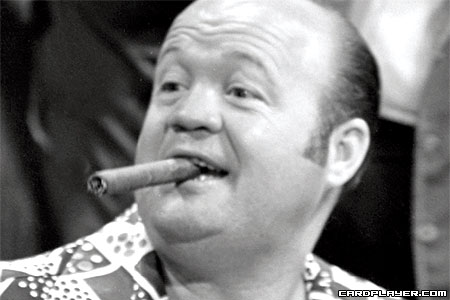Punting Profiles: Puggy Pearson – Crash or Crash Through
By Nick Tedeschi and Tim Napper
Modest Beginnings
Walter Clyde Pearson got the nickname ‘Puggy’ at the age of ten when he crashed through the floorboards of a half-completed church face first, disfiguring his nose to the extent that for the remainder of his life he looked like a cross between an old-time prizefighter and a benevolent Buddha. Pearson was flouting his ability to walk on his hands to some girls he was trying to impress. When he hit a loose floorboard, the whole show went awry and Pearson would forever be known as Puggy.
That incident came to symbolize how Pearson got through poker and through life: with a touch of flair, sense of drama, and fearlessness.
And a tendency to crash, and crash badly.
While Puggy would end up mixing it with the biggest gamblers in the world, his beginnings were not so grand. Pearson, the son of a whiskey bootlegger and sharecropper, was one of nine children raised in total poverty in the hills of Kentucky and Tennessee. He was oft-quoted as saying “I didn’t even know what shoes were until I left home.”
At the age of fourteen, Puggy left school in order to help his family financially. Times were tough and education was not a priority. However, it wasn’t a job, as such, that pulled Puggy out of class. Rather, it was his abilities in the pool rooms of Tennessee. Pearson, both gregarious and grounded in reality, was a natural hustler. He soon realisedhe was as good, better even, at making money on the pool table as any other way. He soon was bringing in enough to support the family.
His penchant for the punt was only further increased when he joined the Navy. Puggy even claimed that he joined the Navy only to gamble, after he saw all the servicemen continue to lose their money in the pool halls he frequented as a youth.
He kept up his pool-hall successes against his fellow Navy boys and there was always a game of cards going on somewhere. Puggy not only learned the craft of poker during this time, he learned the graft of book-making – taking bets and sometimes lending money out to people he’d been beating at the tables. In the Fifties, when Pearson had served his final of three stints in the Navy, he had taken over $20,000 from fellow servicemen and unsuspecting locals on his travels.
Upon his leaving the service, Pearson was inevitably drawn towards the life of a road warrior, a hustler relying on his ability and his nous as he travelled across the US looking for action. He was accustomed to the ways of the road and accomplished in the ways of the hustle. Like the Amarillo Slims and the Doyle Brunsons of the gambling world, Pearson was old school. He knew the tough and dangerous world of the road and walked it with pride.
In his latter years, he liked to be known as “The Rovin’ Gambler.” Emblazoned on the side of his van was the quote: “I’ll play any man from any land any game he can name for any amount he can count”; both a declaration of his style and a challenge to the world.
Of course, Puggy was no fool either. The fine print under the sign said “providing I like it.”
Rise and Fall in Vegas
While there is no doubt that Puggy would have ended up in Vegas, his relocation to Sin City was spurred not only be the thrill of the big bet, but also by self-preservation. The thing is, Pearson had gotten into an argument with another hustler while playing golf and had ended up breaking the man’s skull with a golf club. After the victim got out of hospital, he had got himself a gun and was looking to get revenge on Puggy.
So Pearson figured it was as good a time as any to hit Vegas.
He was adept at all forms of poker and was an action junkie of the highest order. Vegas was a natural fit and he soon ensconced himself in the city in the desert. Young, aggressive, talented and fearless, Puggy won an astounding 750,000 dollars at poker in his first eight months in Vegas, an absolute fortune at that time. He soon became an icon and a local attraction. With his characteristic cigar, his distinctive face and his down-home Southern wisdom, he was known within Vegas and without. Passers-by would stop him in the street and ask for photos with him.
Puggy would often walk into the biggest game in town and yell “deal me in” before he even knew what the game was or who was sitting at the table.
Pearson’s theory behind poker success was simple yet effective. In a time before poker text books and internet coaching, he figured there were only three things a person needed to know: “knowin’ the 60-40 end of a proposition, money management and knowin’ yourself.” If you could tick those three boxes, the Pug figured you would be alright on the tables. Poker wasn’t a complex game for Pearson and he made a habit of taking the cash of those who thought it was. He said “I believe in logics. Cut and dried. Two and two ain’t nothing in this world but four. But them suckers always think its somethin’ different. I play percentages.”
Puggy Pearson rode high on his skill, his wealth, and his fame for many years. It seemed nothing could stop him. Until, of course, something did stop him.
An unstoppable force met an immovable object. Puggy met a brick wall by the name of Tony Spilotro, the mobster made famous by Joe Pesci in the move Casino. You see, back in the 70s Vegas wasn’t clean. There were cheats in many poker games and the mob ran those games. Pearson found himself time and again in high-stakes games where cheating was rife and where Spilotro was getting a cut. So Puggy started to lose, and lose big.
Then Pearson made it worse for himself by pushing his bets. He’d play against the likes of Chip Reese and Doyle Brunson in straight-up games, and they would demolish him. He’d been broke many times and came back. But by the mid-70s Pearson found himself a different sort of broke. As a friend at the time put it: “He had to have lost more than a million in cash. Just gone. It got so bad that he emptied six thousand from a bank account that his son had had since he was in grade school.” He was heavily in debt to his poker friends. His wife had left him. He was in a downward spiral that ending up lasting years.
Now aged in his 40s, he was too old to be broke, and getting to old to make another comeback.
And Rise Again
Then came the 1977 World Series of Poker. Puggy had always done well at the ‘Big Dance’, winning four WSOP bracelets including the 1973 Main Event. But in those days, the real action wasn’t in the Main Event; it was in the side games. And this is where Puggy threw the dice in one last, desperate bid to get out of debt.
Half way through the Series Puggy Pearson was playing – and losing – in a big Seven-Card Stud game, down to his last five thousand of borrowed money. His hopes had begun to fade as he watched pot after pot get pushed in the other direction.
Then he found himself in a huge hand – one that could be his last.
He was in trouble: four hearts to a flush and so committed that he couldn’t fold. He’d live or die on it. He got dealt his last card and squeezed it out real slow.
Then he took a puff on his cigar and turned it over, a wry smile on his face. The final card was a heart. He made his flush. He was saved. After winning that hand he went on a tear, going on to win half a million dollars in the side action of the ’77 Series. He paid off his debts, restored his bank roll and his self-respect, and never looked back.
But Puggy knew that enough was enough. His son, Steve, put it like this: “he stayed away from the toughest games, curtailed gambling with the Chip Reeses and Doyle Brunsons of the world, and went after less seasoned gamblers with smaller bankrolls… He finally learned to keep his ego in check. ” Puggy had gone back to his old maxim – play the percentages.
Pearson had restored his reputation.
A decade later he became (at the time) only the second living player to be inducted into the Poker Hall of Fame.
He had ascended to the pantheon of poker greatness and gambling legend.
In April 2006, Puggy Pearson died. He had been in ill health for many years but that hadn’t keep him from the action. Only death would stop him and even that is only a 4 to 1 proposition, because wherever dead people go – whether heaven, hell, or the island in Lost – Pearson will no doubt be talking the talk, walking the walk, and collecting the cash.

